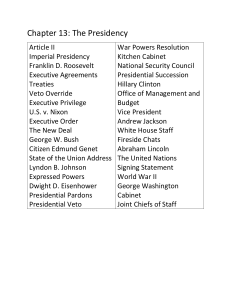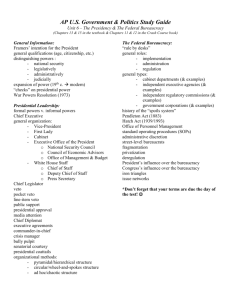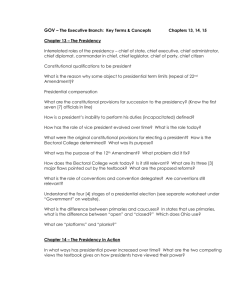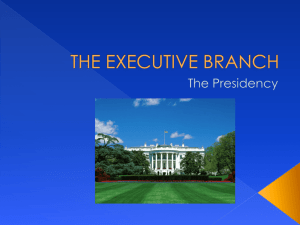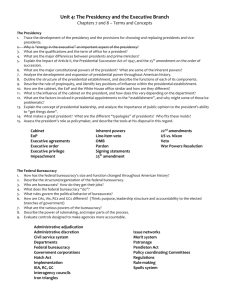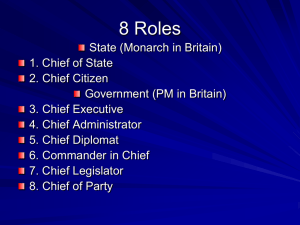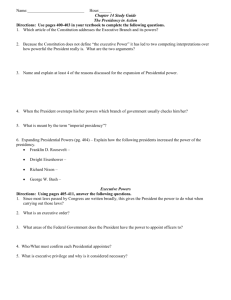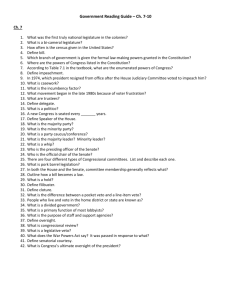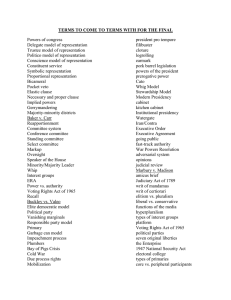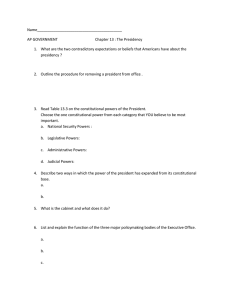Chapter 9-2: Role of the President
advertisement
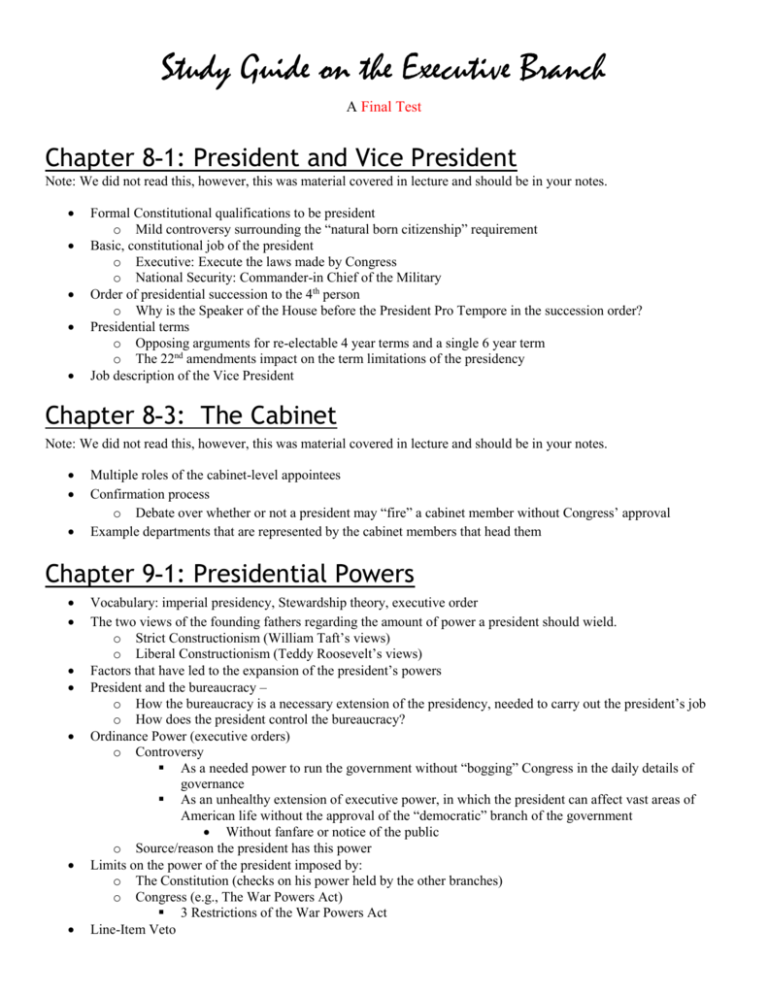
Study Guide on the Executive Branch A Final Test Chapter 8-1: President and Vice President Note: We did not read this, however, this was material covered in lecture and should be in your notes. Formal Constitutional qualifications to be president o Mild controversy surrounding the “natural born citizenship” requirement Basic, constitutional job of the president o Executive: Execute the laws made by Congress o National Security: Commander-in Chief of the Military Order of presidential succession to the 4th person o Why is the Speaker of the House before the President Pro Tempore in the succession order? Presidential terms o Opposing arguments for re-electable 4 year terms and a single 6 year term o The 22nd amendments impact on the term limitations of the presidency Job description of the Vice President Chapter 8-3: The Cabinet Note: We did not read this, however, this was material covered in lecture and should be in your notes. Multiple roles of the cabinet-level appointees Confirmation process o Debate over whether or not a president may “fire” a cabinet member without Congress’ approval Example departments that are represented by the cabinet members that head them Chapter 9-1: Presidential Powers Vocabulary: imperial presidency, Stewardship theory, executive order The two views of the founding fathers regarding the amount of power a president should wield. o Strict Constructionism (William Taft’s views) o Liberal Constructionism (Teddy Roosevelt’s views) Factors that have led to the expansion of the president’s powers President and the bureaucracy – o How the bureaucracy is a necessary extension of the presidency, needed to carry out the president’s job o How does the president control the bureaucracy? Ordinance Power (executive orders) o Controversy As a needed power to run the government without “bogging” Congress in the daily details of governance As an unhealthy extension of executive power, in which the president can affect vast areas of American life without the approval of the “democratic” branch of the government Without fanfare or notice of the public o Source/reason the president has this power Limits on the power of the president imposed by: o The Constitution (checks on his power held by the other branches) o Congress (e.g., The War Powers Act) 3 Restrictions of the War Powers Act Line-Item Veto o o Arguments for and against Clinton v New York (why did the Supreme Court declare the line item veto as unconstitutional in this case?) Chapter 9-2: Role of the President Know a basic definition and powers of the following roles of the president o Chief of State o Chief Executive o Judicial Powers: Pardon, Amnesty, commutation, reprieve o Chief Legislator: Suggestion Power, Pocket Veto (and its cousin) o Chief Diplomat Importance of “recognition” Impact of the 2/3 Senate ratification requirement o Chief of Party “Coattails” and other influences the presidency has on non-presidential elections o Commander in Chief Chapter 10-1: Bureaucratic Organization Revisit the information about the role of the Cabinet level departments Definition (and example) of “Government Corporation” Regulation v Deregulation o Regulatory powers: need for regulatory control versus the dangerous (?) consolidation of all 3 types of government power in the hands of “untouchable” bureaucrats Regulatory Agency leadership structure o Arguments for deregulation: American belief in the wisdom and ability of the “invisible hand” Opposition to the growing size of government’s/president’s power Others from notes o Arguments for regulation: Social Justice (Thomas Hobbes’ notion that life without government/regulation is “poor, nasty, brutish, and short) Certain areas of the life, often the economy, work more productively when consciously managed rather than left to “nature” Others from notes Privatization of government service o Pros and Cons from notes Chapter 10-2: The Civil Service System The Spoils System and the Pendleton Act The Hatch Act o Fear of interference in politics Who else gets to choose their boss? Members of the executive branch having power over the choice of the legislative branch members o Does it unfairly limit the citizenship rights of government employees? Debate over pay/benefits of Civil Servants and their effect on quality versus expense Problems with the civil service o Retention of upper management o Problems with getting rid of poor employees

